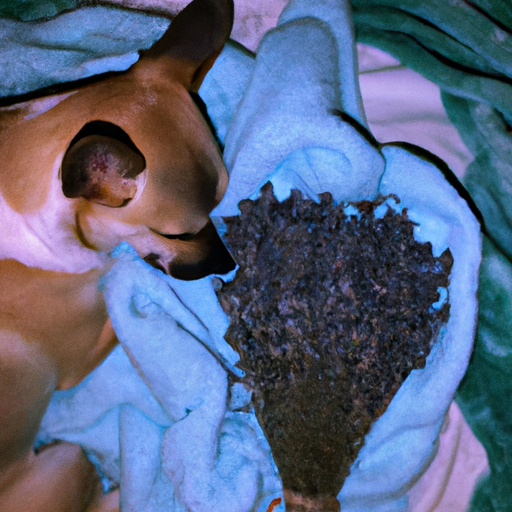As a loving and concerned dog owner, you might often find yourself wondering, “What can I give my dog to sleep at night?” Especially when you see your furry friend struggling to get a good night’s sleep. This comprehensive guide will provide you with multiple solutions to aid your dog’s sleep.
1. Is Your Dog Having Trouble Sleeping?
Before delving into possible solutions, it’s crucial to identify whether your dog is indeed having trouble sleeping. Dogs sleep differently than humans, and what might seem like restlessness to us can be perfectly normal for dogs.
Some signs of sleep trouble in dogs include:
- Frequent waking
- Restlessness or pacing at night
- Whining or barking during sleep
- Excessive daytime sleepiness
If your dog exhibits any of these signs, it might be time to explore sleep aids.
2. Natural Sleep Aids for Dogs
There are several natural remedies you can try to help your dog sleep better at night. These include:
- Chamomile: A calming herb often used in humans, chamomile can also have a sedative effect on dogs.
- Melatonin: This hormone regulates sleep-wake cycles in both humans and dogs.
- CBD Oil: While more research is needed, CBD oil has been shown to help some dogs with sleep problems.
Please remember, it’s essential to consult with your vet before starting your dog on any new supplement or remedy.
3. Environmental Changes
Sometimes, simple environmental changes can make a big difference. Consider the following:
- Comfortable Bedding: Ensure your dog has a comfortable, quiet place to sleep.
- Temperature: If it’s too cold or too hot, your dog might have trouble sleeping. Aim for a comfortable room temperature.
- Lighting: Dogs sleep better in the dark, so try to minimize light as much as possible.
4. Regular Exercise
Regular exercise is crucial for your dog’s overall health and can significantly impact their sleep quality. An appropriately exercised dog will sleep better and more deeply.
| Exercise Type | Frequency | Duration |
|---|---|---|
| Walks | Daily | 30 minutes to 1 hour |
| Playtime | Daily | 15 to 30 minutes |
| Training | A few times per week | 15 to 20 minutes |
5. Dietary Considerations
What your dog eats can influence their sleep patterns. A balanced diet is crucial for healthy sleep. Avoid feeding your dog close to bedtime as digestion can disrupt their sleep.
6. Consult a Vet
If natural remedies and environmental changes aren’t helping, it’s time to consult your vet. They can rule out underlying health issues and may suggest prescription sleep aids if necessary.
7. Training for Better Sleep
Training your dog to follow a consistent sleep-wake cycle can be beneficial. Establishing a bedtime routine can signal your dog that it’s time to wind down and sleep.
8. Frequently Asked Questions (FAQs)
Q: Can I give my dog human sleep aids?
A: Never give your dog human medication without consulting your vet. Some human sleep aids can be toxic to dogs.
Q: How much sleep does my dog need?
A: Most adult dogs need between 12 to 14 hours of sleep a day, while puppies and older dogs require more.
Q: My dog sleeps all day and stays awake at night. What should I do?
A: Try to engage your dog in more daytime activity and establish a consistent sleep-wake cycle. If the problem persists, consult your vet.
In conclusion, if your dog is having difficulty sleeping, there are several steps you can take to help. Always remember to consult your vet before starting any new treatment or supplement. A good night’s sleep is not only essential for your dog’s health but also for their happiness and yours.



